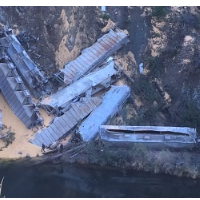Derailment Dumps 11 Train Cars of Corn—not Oil, This Time—in Feather River Canyon
 Feather River Canyon derailment (photo: KCRA Sacramento)
Feather River Canyon derailment (photo: KCRA Sacramento)
A Union Pacific train on its way to the Central Valley derailed Tuesday in Plumas County’s Feather River Canyon, sending 11 cars full of corn and grain down a steep embankment and into the water. No injuries were reported, the track was replaced within 24 hours and the corn clean-up was going well.
Accidents happen in a complicated world. No harm, no foul.
But it easily could have been very foul. One million gallons of volatile Bakken crude oil from North Dakota pass along these tracks every each week. “When you hear about a derailment, even if it's just corn, you can’t help but imagine, what if it was Bakken crude?” Stacey Geis, the managing attorney at Earthjustice told KCRA Sacramento.
Rail and oil companies would like to double that traffic, for openers, as they search for ways to transport oil from new fields made possible by oil extraction techniques like fracking. The ability of energy companies to access this previously inaccessible crude and refine it has outstripped conventional methods of shipping the stuff via pipeline or ocean tanker between the two locations. So they have turned elsewhere.
Imports by rail in the state increased 506% in 2013 over the year before. That still only raised the percentage of total imports by rail to 1%. Oil by tanker is 70% and pipeline does the rest. But a state government report report, “Oil by Rail Safety in California,” projects that if everything goes the way rail and oil companies hope, 25% of the imports will be via rail by 2016.
Everyone knows railroads aren’t ready to handle the extra load.
California has more than 6,000 miles of track and a lot of bridges whose maintenance is questionable. A safety alert in January from the U.S. Pipeline and Hazardous Materials Safety Administration (PHMSA) highlighted the fact that many of today’s tanker cars are ill-equipped to handle their modern loads. Transportation experts warn that aging train cars are susceptible to rupture and puncture in a derailment.
That would be bad for a normal cargo of oil, but Bakken crude is special. The alert said, “Recent derailments and resulting fires indicate that the type of crude oil being transported from the Bakken region may be more flammable than traditional heavy crude oil.”
While critics of crude-by-rail are quick to illustrate its dangers by pointing to a 72-car train derailment in Lac-Mégantic, Quebec, last year that spilled 1.5 million gallons of flaming Bakken crude and killed 47 people, longtime Northern California residents remember 1991. That year, a 97-car train derailed in the upper Sacramento River Gorge, spilling 19,000 gallons of metam sodium, a pesticide used in farming.
The pesticide formed a plume at Lake Shasta three-quarters of a mile long, 100 yards wide and 18 feet deep. It killed more than a million fish and left hundreds of residents and cleanup workers ill.
State and local governments are playing catch-up, trying to find out where and when crude oil trains are running and what kind of loads they are carrying. But efforts to regulate railroads run afoul of federal authority over interstate transportation and corporate zeal to shield their operations behind claims of protection for trade secrets.
California Office of Emergency Services Deputy Director Kelly Huston told KXTV that the state “dodged a bullet” at Feather River. He said an oil spill in that location would have seriously contaminated water flowing into Lake Oroville, the state’s second-largest reservoir. The lake is a key component of the State Water Project, which delivers copious amounts of drinking water and feeds the Feather River Fish Hatchery and the Fish Barrier Pool.
The accident provided a striking picture of looming disaster posed by increasing shipments of oil-by-rail through the environmentally sensitive area. But for those looking for half-filled glasses, only 11 of the train’s 106 cars fell off the tracks and none were carrying hazardous materials—this time.
–Ken Broder
To Learn More:
Railroad Reopens after Feather River Canyon Derailment (by Roger Aylworth, Chico Enterprise-Record)
Gov’t Data Sharpens Focus on Crude-Oil Train Routes (by Isaiah Thompson, ProPublica)
Derailment Sends Section of Train into the Feather River Canyon (by Dave Marquis, KXTV)
State Confirms Huge Jump in Dangerous Oil-by-Rail Shipments but Details Are a Trade Secret (by Ken Broder, AllGov California)
On Track for Disaster (by Alistair Bland, Chico Enterprise-Record)
Emergency Response to Rail Accidents Regulatory Framework (Joint Hearing of the Senate Environmental Quality and Natural Resources and Water Committees)
- Top Stories
- Controversies
- Where is the Money Going?
- California and the Nation
- Appointments and Resignations
- Unusual News
- Latest News
- California Forbids U.S. Immigration Agents from Pretending to be Police
- California Lawmakers Urged to Strip “Self-Dealing” Tax Board of Its Duties
- Big Oil’s Grip on California
- Santa Cruz Police See Homeland Security Betrayal in Use of Gang Roundup as Cover for Immigration Raid
- Oil Companies Face Deadline to Stop Polluting California Groundwater





